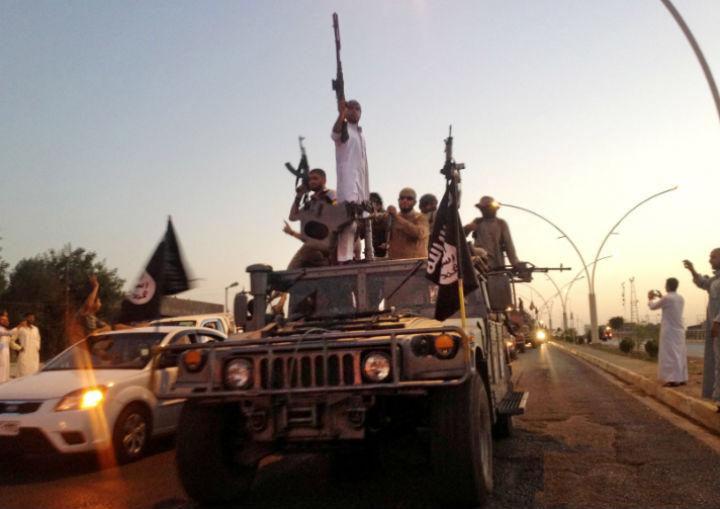ISIS has been held back thanks to U.S.-led airstrikes, according to U.S. Secretary of State John Kerry, but the battle against the Islamist militant group could go on for some time.

The U.S. has been dropping bombs on ISIS targets in Iraq since early August, but with the help of international partners, since late September, the aerial campaign has not only increased but expanded to include Syria.
Kerry, in Brussels for a meeting of the 60 nations involved in the U.S.-led coalition against ISIS, called the progress “significant.” Of those 60 nations, only 12 are assisting the U.S. in launching airstrikes, while the others are providing humanitarian aid.
Kerry said the Sunni extremist group’s “advance across Syria and into Iraq is being halted.” But he said the international mission would “continue for as long as it takes. “Our commitment will most likely be measured in years,” Kerry said.
Canada is one of the seven countries involved in the air combat mission against ISIS in Iraq, while five Gulf states have assisted with attacks on targets in Syria. (Some U.S. strikes have also hit targets in Syria related to al-Qaeda-affiliated Jabhat al-Nusra and the so-called Khorosan group.)
The U.S. and its partners have launched 11 airstrikes in Iraq and 14 in Syria since Monday, hitting ISIS-controlled infrastructure and heavy equipment in Iraq and fighting positions in Syria, according to U.S. Central Command.
But the mission is largely an American effort, with the U.S. conducting 85 per cent of the airstrikes: the U.S. has launched at total of 942, since Aug. 8, while its allies have fired 189 strikes, Al Jazeera reported.
The U.S. and the international coalition members see success in the mission, saying the strikes have limited ISIS advances.
READ MORE: New ISIS video shows training of child soldiers in Iraq
Dr. Fathally Jabeur, a professor of international law at the University of Ottawa, said the airstrikes are having a positive effect, but they are only “a part of the solution,”
“We see this group is not progressing as much as they did before,” he said. “If you remember in the month of June, ISIS almost occupied more than two-thirds of Iraqi territories. Now, they are not progressing. They are not moving as fast as they did before.”
Jabeur concurred with critics who suggest the bombings won’t be enough to halt ISIS entirely. Even Kerry admitted that.
“Canada recognizes that a campaign across multiple lines of effort is required, and supports an increase in high-level political discussions,” Foreign Minister John Baird also said on Wednesday. “While the military mission is an important part of the global response to ISIL’s barbaric methods, the international community cannot succeed in stopping this scourge by military means alone.”
READ MORE: ISIS leader threatens Canada, says it will fight to the last man in audio recording
Jabeur, in an interview with Global News last week, said it will require soldiers on the ground. But, more importantly, he said, greater cooperation is needed with regional partners, “mainly the Iranian regime and, unfortunately, the Syrian government. “Because we cannot fight and get rid of this group without collaborating with these two countries,” he said.
The governments of Syria and Iran figured into developments on Wednesday, as Kerry made his statements.
The Pentagon revealed it appeared Iran had fired its own airstrikes against ISIS in Iraq, inside a self-declared buffer zone established in Diyala province. U.S. Rear Adm. John Kirby said the strikes were not in coordination with U.S.-led operations.
Kerry, who didn’t confirm the claims while speaking in Brussels, said: “If Iran is taking on (IS) in some particular place… and it has an impact, then it’s going to be net effect (that) is positive.”
Canada doesn’t quite hold that view. The Dept. of Foreign Affairs, Trade and Development said it was aware of the reported Iranian airstrikes, but said it is skeptical of whether Iranian regime being “genuinely committed to stabilizing Iraq.
“Ultimately, Iran’s history of regional meddling and support for terrorist organizations only serve to destabilize countries like Syria and Iraq,” department spokesperson Francois Lasalle said in a statement to Global News.
Either way, Iranian officials denied the claims.
Meantime, Syrian President Bashar al-Assad said the strikes on ISIS have had no “tangible results” since the international campaign began.
“You can’t end terrorism with aerial strikes. Troops on the ground that know the land and can react are essential,” he told Paris Match in an exclusive interview, excerpts of which were released prior to publication on Thursday.
No country in the coalition has committed ground troops, although the U.S. has committed up to 3,000 troops to assist with training and advising Iraqis. Canada, in September, committed up to 69 troops to advise Peshmerga fighters in Iraqi Kurdistan.
Assad — who has ordered brutal attacks on civilians and opposition groups throughout the country’s three-and-a-half-year civil war, leading to the deaths of approximately 200,000 people and created an international refugee crisis — has recently carried out his own airstrikes against ISIS, a move the U.S. has criticized.
READ MORE: UN suspends food voucher program for Syrian refugees




Comments